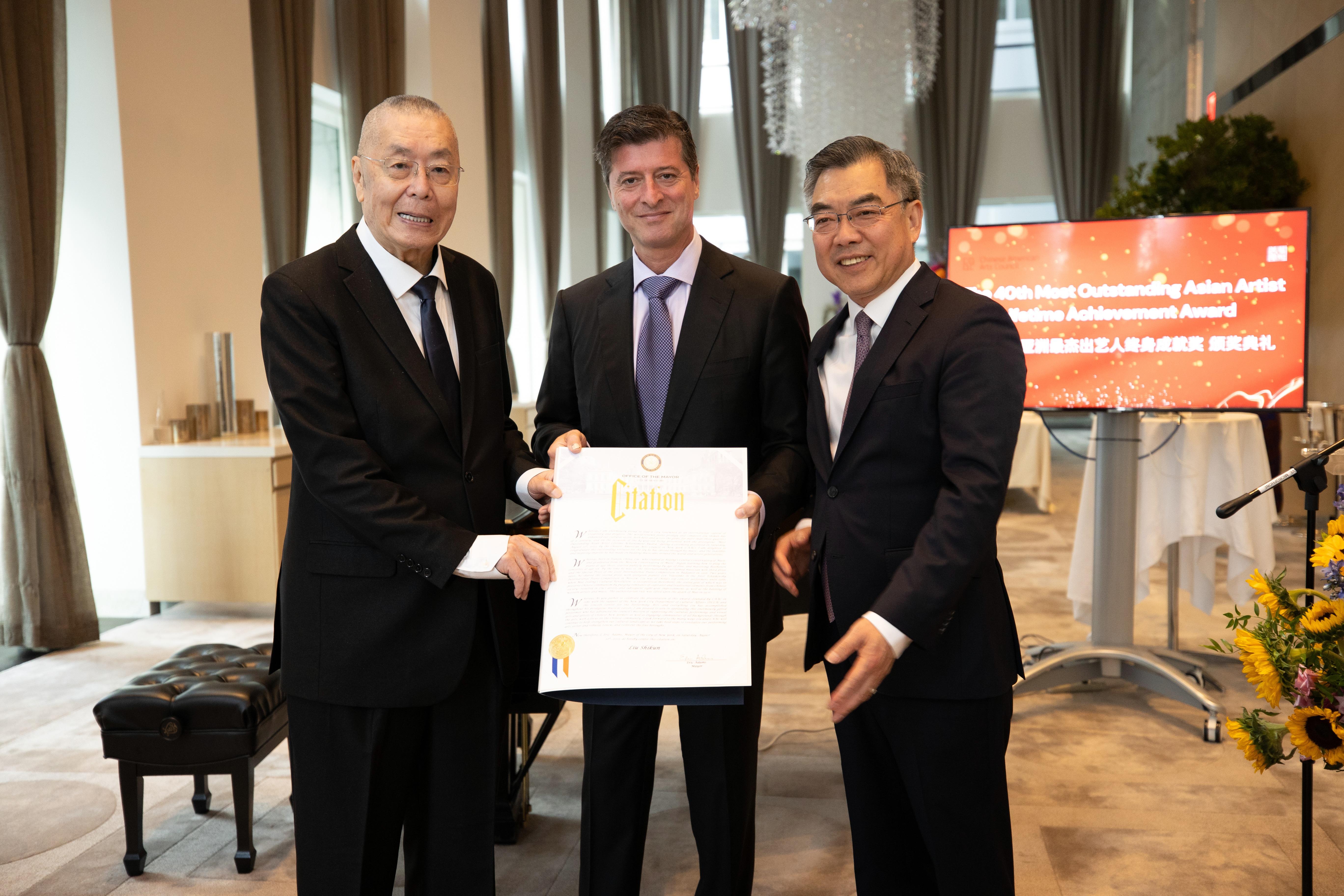 Liu Shih Kun (left) receives the award from Edward Mermelstein (center), commissioner of International Affairs New York, along with Huang Ping, Chinese consul general in New York, on Saturday in New York. (SANDY FAN / FOR CHINA DAILY)
Liu Shih Kun (left) receives the award from Edward Mermelstein (center), commissioner of International Affairs New York, along with Huang Ping, Chinese consul general in New York, on Saturday in New York. (SANDY FAN / FOR CHINA DAILY)
Traversing the world city after city, Chinese pianist Liu Shih Kun bridges countries and cultures through the harmonious dance of black and white keys.
"Playing the piano is first my profession, in other words, my livelihood, and secondly my expertise, but also my career," the 84-year-old said.
Liu has received numerous piano awards for both domestic and international competitions. Three awards he won are the most meaningful honors in his career. He received them at the China Children's Piano Competition in Shanghai, the Franz Liszt International Piano Competition in Budapest, and the International Tchaikovsky Competition in Moscow.
On Saturday, Liu received yet another award — the Most Outstanding Asian Artist Lifetime Achievement Award from the Chinese American Arts Council in New York.
"I have received numerous awards in the past, but this award holds a profound meaning for me and has made me feel particularly honored," Liu said.
"I never expected to receive an award at this age, as it's considered a time for retirement. Receiving this award feels like a boost of energy for me. I'm extremely happy. I never thought that in my 80s there would still be some remaining value in me."
Established in 1981, the award is one of the most significant honors dedicated to recognizing excellence in the Asian arts community in the United States. Past awardees include pianist Fou Ts'ong, Chinese opera performers Hung Sin Nui, Zhang Junqiu, Gu Zhengqiu, playwright David Henry Hwang, and cellist Yo-Yo Ma.
New York State Governor Kathy Hochul congratulated Liu, acknowledging his outstanding accomplishments as a pianist and musician, and the immense pride he has brought to Asian communities throughout his life.
New York City Mayor Eric Adams described Liu as "a globally acclaimed piano prodigy and performer who has made a tremendous contribution to the cultural sector" and commended "the incredible and inspiring imprint he has made on budding musicians around the world and across generations".
'Friendly relationship'
"Winning this award has further promoted a friendly relationship between China and the US, and it also enhanced the status of Chinese Americans in the US," Adams said.
Chinese Ambassador to the US Xie Feng sent a congratulatory letter to Liu, saying the musician "has been committed to advancing the art of piano performance in China and promoting cultural exchanges".
Liu said he will continue to use his music to build connections between cultures. He has been a pioneer in bilateral cultural exchange for decades.
In 1958, the then 19-year-old Liu took second place in the International Tchaikovsky Competition, after US pianist Van Cliburn.
Liu's talent also earned him recognition among many music fans in the US. In the 1970s, he and his music played a significant role in promoting the budding diplomatic relationship between the US and China.
In 1973, during the historic first visit of the Philadelphia Orchestra to China, Liu gave a solo performance at Beijing's Cultural Palace of Nationalities, where he received a standing ovation. The visit opened a new chapter in deepening friendship between the two peoples.
In 1978, as vice-chairman and chief performer of the Chinese Art Delegation, Liu became one of the earliest Chinese artists to tour in the US and was received by president Jimmy Carter at the White House Rose Garden.
"At that time, we (China and the US) didn't yet have formal diplomatic relations at the embassy level, so we stayed at the so-called Chinese liaison office in the US," Liu said. "We toured in New York, Washington, Los Angeles, San Francisco and so on."
In 1979, he collaborated with the Boston Symphony Orchestra to perform in Beijing and returned to the US for two additional concerts at the invitation of Seiji Ozawa, music director of the orchestra.
Music has built the connection historically between the East and West, among different countries' ideologies, Liu said.
"Music is universal. It bridges gaps and knows no boundaries," he said.


